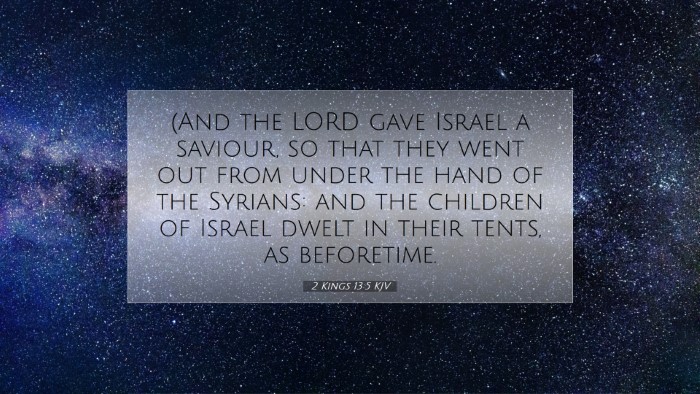Commentary on 2 Kings 13:5
Verse: "And the Lord gave Israel a savior, so that they went out from under the hand of the Syrians: and the children of Israel dwelt in their tents, as beforetime." (2 Kings 13:5)
Introduction
This passage occurs during a period of distress for Israel, marked by oppression from the Syrians. The promise of deliverance and restoration encapsulated in this verse speaks profoundly to the faithfulness of God and His unwavering commitment to His people, despite their unfaithfulness. This commentary synthesizes insights from revered public domain theologians such as Matthew Henry, Albert Barnes, and Adam Clarke.
The Context
The historical backdrop of 2 Kings 13 is critical for understanding the implications of this verse. Israel was experiencing the consequences of their sin against God, often leading to divine discipline manifested through foreign oppression. The need for salvation from the hand of the Syrians arose from both their military aggression and Israel's spiritual degradation.
Historical Interpretation
- Matthew Henry: Henry reflects on the turbulent times of Israel, emphasizing the cycle of sin, oppression, repentance, and deliverance that characterizes the Hebrew Scriptures. He notes that God, in His mercy, provided a savior, highlighting the divine initiative in Israel's restoration.
- Albert Barnes: Barnes discusses the notion of a "savior" in this context, emphasizing that this term refers not just to military leaders but to a broader understanding of salvation encompassing spiritual reconciliation with God.
- Adam Clarke: Clarke analyzes the historical significance of the verse, positing that this savior was likely Jehoash (Joash), who led Israel in military campaigns against Syria, thus restoring Israel's freedoms and dignity.
Theological Insights
This verse encapsulates profound theological themes worthy of deeper reflection.
- Divine Mercy: The granting of a savior reveals God's grace. Despite Israel's repeated unfaithfulness, God remained attentive to their cries for help. As Henry states, "God is ever ready to help us in our distresses; we should return to Him in sincere repentance."
- Human Response: The reinstatement of Israel under the leadership of a savior required their acknowledgment of God’s mercy and a turning back to Him. This reflects the essential aspect of repentance as a precursor to experiencing God's deliverance.
- Redemptive History: Barnes points to this action as part of the larger narrative of redemption. Israel's temporary relief under this savior serves as a foreshadowing of the ultimate Savior, Jesus Christ, who delivers not only from physical oppression but also from sin and death.
Applications for Contemporary Believers
The lessons from 2 Kings 13:5 are relevant for today's church and individual believers, providing several key applications:
- Hope in Despair: Just as Israel found hope amidst dire circumstances, believers today are reminded that God's salvation is always near. Crisis can lead to spiritual awakening and restoration.
- Faithfulness of God: This verse reassures followers of Christ of God's unchanging character. Even when unfaithful, God remains faithful, making provision for salvation and restoration for those who repent.
- Call to Action: Clarke emphasizes that recognizing God’s past deliverance should compel believers toward sincere worship and obedience, motivating them to share the message of hope found in Christ.
Conclusion
2 Kings 13:5 serves as a poignant testimony to God’s unwavering commitment to His people, highlighting the intersection of divine mercy and human response. As explored through the insights of Henry, Barnes, and Clarke, this verse illustrates the dynamics of salvation—a theme that resonates throughout Scripture and finds its ultimate expression in the gospel of Jesus Christ. As pastors, scholars, and students of the Word reflect on this passage, they are encouraged to find both challenge and comfort in the knowledge of God’s ongoing work in the lives of His people.


